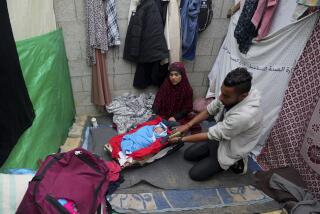Iraq cracks down in Shiite city
- Share via
BAGHDAD — Prime Minister Nouri Maliki visited the southern port of Basra on Monday in preparation for a new security crackdown in the troubled Shiite Muslim city. Tensions were also apparent in Baghdad, where followers of radical Shiite cleric Muqtada Sadr protested their treatment by Iraqi security forces.
The new Basra security offensive, including a 10 p.m. to 6 a.m. curfew, was announced in a statement from Maliki read on state television late Monday by Maj. Gen. Abdul Kareem Khalaf, spokesman for the Interior Ministry.
“To all those who are outlaws . . . realize that the hands of law and justice will reach them however long it will take,” Maliki’s statement read.
An additional army battalion arrived in Basra, which until late last year had been administered by the British after the fall of Saddam Hussein in 2003. The security plan, called the “Knights’ Onslaught,” closes all schools for three days and bans vehicles from entering the province until further notice.
Basra has been torn by fighting among Shiite political parties and their militias, which are in competition for the south’s lucrative oil reserves. Underscoring the ongoing instability, a bomb exploded near Interior Minister Jawad Bolani’s convoy in the city Sunday night, security sources said, and a civilian was killed in an early-morning shootout between police and fighters from Sadr’s Mahdi Army in Qurnah, about 45 miles north of Basra.
The withdrawal of British troops from the city in September and the formal hand-over of security responsibility to the Iraqi army and police three months later have failed to pacify Basra. Some American and Iraqi officials in Baghdad have called the controversial moves a failure even as the British government continues to defend them. Iraq’s national government is eager to impose its will on Basra, but the city has yet to be tamed despite repeated British and Iraqi offensives against Shiite militias and criminal gangs since 2006.
The capital witnessed its own friction between Shiite factions Monday as the Sadr movement organized protests in west Baghdad. Leaders from Sadr’s movement vowed to mount daily protests until the Shiite-run Iraqi government stops targeting its members in raids, releases detainees and apologizes for the conduct of security force members. They accused the government of trying to weaken Sadr’s organization ahead of provincial elections scheduled for October.
Most provinces, from Baghdad south, are controlled by Sadr’s rivals in the Shiite fundamentalist parties Islamic Dawa and the Supreme Islamic Iraqi Council.
Baghdad police said gunmen marched through the streets and others burned tires as the protests spread across several neighborhoods, including Amal, Shula and Shurta. Sadr’s supporters insisted that the rallies were peaceful and that no gunmen were present. They vowed their demonstrations would continue today.
“The shops were closed but it was voluntary. . . . Most of the shops had banners saying words like, ‘We protest the detention of our sons and brothers,’ ” said Abu Haidar, a community leader from the Amal neighborhood.
Sadr called a six-month cease-fire for his militia after clashes erupted between his followers and Supreme Islamic Iraqi Council supporters in the pilgrimage city of Karbala in late August. He extended the cease-fire for another six months in late February, but since then, some of his rank-and-file supporters have fought with Iraqi soldiers and police in the southeastern city of Kut.
Sadr parliament bloc member Nassar Rubaie blamed Iraq’s police and army for carrying out political parties’ agendas, in a veiled reference to the Islamic Dawa Party and the Supreme Islamic Iraqi Council.
“They are wearing the uniforms of the army and police but implementing the agendas of the parties, and this is obvious in the southern provinces,” he said. “We all know how popular the Sadrists are. Those parties are afraid of the Sadrists as elections approach. They are clinging to power.”
The Sadr movement, which claims to represent millions of Iraqis, wants greater power in southern Iraq. The Supreme Islamic Iraqi Council won the largest number of provincial councils from Baghdad to Basra in January 2005 elections, but the Sadr movement believes it can now rout its rivals.
Officials from Maliki’s government worry that Sadr’s followers could have been behind mortar strikes Sunday on Baghdad’s fortified Green Zone, home to the Iraqi government and the U.S. Embassy. They believed the attacks were probably meant to remind Iraqi and U.S. officials of the Mahdi Army’s ability to affect Baghdad’s stability.
“They wanted to show they can cause significant damage to the security situation,” said an official who works in Iraq’s Cabinet but declined to give his name because of the sensitivity of the topic.
Parliament member Sami Askari, who has close ties to Maliki, said that security officials in the government believed the Mahdi Army was behind the attack.
He warned that there was no clear distinction between mainstream Sadr backers and those U.S. officials believe are funded by Iran and have not honored Sadr’s call for a truce.
He said it was possible the mainstream Sadr followers were encouraging their more radical elements.
--
--
Times staff writers Saif Rasheed, Usama Redha and Said Rifai in Baghdad and a special correspondent in Basra contributed to this report.
More to Read
Sign up for Essential California
The most important California stories and recommendations in your inbox every morning.
You may occasionally receive promotional content from the Los Angeles Times.













